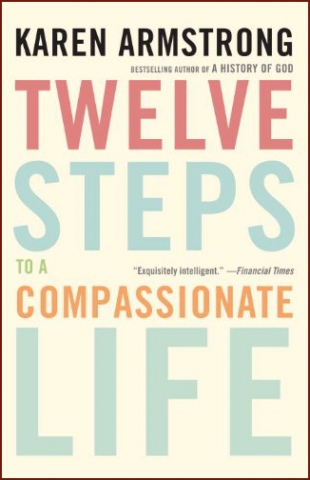On November 12, 2009, a new Charter for Compassion was unveiled to a global community poised to embrace this spiritual practice as a way of transforming ourselves and our world. The Charter aims to restore not only compassionate thinking but, more importantly, compassionate action to the center of religious, moral and political life. Compassion is the principled determination to put ourselves in the shoes of the other; it lies at the heart of all religious and ethical systems.
The Charter was proposed by world religions scholar Karen Armstrong when she won the TED Prize in 2008 and was asked to make "One Wish to Change the World." She wanted help in creating, launching, and propagating a Charter for Compassion. Since that day, thousands of people have contributed ideas to the process. A Council of Conscience, a multifaith, multinational group of religious thinkers and leaders, including Sister Joan Chittister, Archbishop Desmond Tutu, Tariq Ramadan, and David Saperstein, reviewed and sorted through all the contributions to craft the final Charter. It is not simply a statement of principle; it is above all a summons to creative, practical and sustained action to meet the political, moral, religious, social and cultural problems of our time. Further support for the Charter for Compassion is being provided by the Fetzer Institute.
The challenge faced by all human beings is, according to Armstrong, "to withstand the me-first mechanisms of the old reptilian brain." Easier said than done as many religious and spiritual practitioners have discovered over the centuries. She believes humans have natural capacities both for cruelty and for compassion. Where does one start in the process of retraining ourselves to be more loving, empathetic, and kind? Armstrong presents a portrait of sages, prophets, and mystics from all the world's religions who have struggled to incorporate compassion into their private and public lives.
In the spirit of the 12-Step program of Alcoholics Anonymous, the author presents exercises that can nurture compassion and provide guidance on this spiritual practice. The Steps are:
1. Learn about Compassion
2. Look at Your Own World
3. Compassion for Yourself
4. Empathy
5. Mindfulness
6. Action
7. How Little We Know
8. How Should We Speak to One Another?
9. Concern for Everybody
10. Knowledge
11. Recognition
12. Love Your Enemies
Armstrong hits high stride with her insights into the shadow, imagination, making a resolution each day to act in concordance with the Golden Rule, respecting mystery, and incarnating hospitality. She concludes:
"Even in our torn and conflicted world some people have achieved heroic levels of empathy, forgiveness, and 'concern for everybody.' We are not doomed to live in misery, hatred, greed, and envy."
